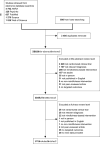Mindfulness-based interventions for psychiatric disorders: A systematic review and meta-analysis
- PMID: 29126747
- PMCID: PMC5741505
- DOI: 10.1016/j.cpr.2017.10.011
Mindfulness-based interventions for psychiatric disorders: A systematic review and meta-analysis
Abstract
Despite widespread scientific and popular interest in mindfulness-based interventions, questions regarding the empirical status of these treatments remain. We sought to examine the efficacy of mindfulness-based interventions for clinical populations on disorder-specific symptoms. To address the question of relative efficacy, we coded the strength of the comparison group into five categories: no treatment, minimal treatment, non-specific active control, specific active control, and evidence-based treatment. A total of 142 non-overlapping samples and 12,005 participants were included. At post-treatment, mindfulness-based interventions were superior to no treatment (d=0.55), minimal treatment (d=0.37), non-specific active controls (d=0.35), and specific active controls (d=0.23). Mindfulness conditions did not differ from evidence-based treatments (d=-0.004). At follow-up, mindfulness-based interventions were superior to no treatment conditions (d=0.50), non-specific active controls (d=0.52), and specific active controls (d=0.29). Mindfulness conditions did not differ from minimal treatment conditions (d=0.38) and evidence-based treatments (d=0.09). Effects on specific disorder subgroups showed the most consistent evidence in support of mindfulness for depression, pain conditions, smoking, and addictive disorders. Results support the notion that mindfulness-based interventions hold promise as evidence-based treatments.
Keywords: Evidence-based treatments; Meditation; Meta-analysis; Mindfulness; Psychiatric disorders; Relative efficacy.
Copyright © 2017. Published by Elsevier Ltd.
Conflict of interest statement
RD is the founder, president, and serves on the board of directors for the non-profit organization, Healthy Minds Innovations, Inc. In addition, RD serves on the board of directors for the Mind and Life Institute.
Figures





References
-
- Agency for Healthcare Research and Quality. Methods guide for effectiveness and comparative effectiveness reviews. Rockville, MD: Agency for Healthcare Research and Quality; 2014. - PubMed
-
- American Psychiatric Association. Diagnostic and statistical manual of mental disorders. 5th. Washington, DC: Author; 2013.
-
- American Psychological Association. Research-supported psychological treatments. 2017 Jan 2; Retrieved from: https://www.div12.org/psychological-treatments/
-
- Asl NH, Barahmand U. Effectiveness of mindfulness-based cognitive therapy for co-morbid depression in drug-dependent males. Archives of Psychiatric Nursing. 2014;28(5):314–318. - PubMed
-
- Atkins D, Eccles M, Flottorp S, Guyatt GH, Henry D, Hill S, The GRADE Working Group Systems for grading the quality of evidence and the strength of recommendations I: Critical appraisal of existing approaches The GRADE Working Group. BMC Health Services Research. 2003;4(38) doi: 10.1186/1472-6963-4-38. - DOI - PMC - PubMed
Publication types
MeSH terms
Grants and funding
LinkOut - more resources
Full Text Sources
Other Literature Sources
Medical

